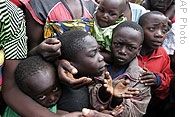voa标准英语2008年-WHO Warns of Cholera and Measles Epidemics in D(在线收听)
 |
| Children plead with aid workers to get coupons for high energy biscuits at a displaced people's camp in Kibati, in eastern Congo, 04 Nov 2008 |
The World Health Organization says foreign governments are providing large quantities of medical supplies to save lives in eastern Democratic Republic of Congo.
It says Norway and Italy have made significant contributions in providing medicines to treat more than 200,000 people at risk of diarrheal diseases, malaria, trauma and other critical conditions for one month.
But, WHO Spokesman Paul Garwood says more support is needed from the international community to curb health threats in the region.
"We see there that four out four people are not fully immunized," he said. "That there are high fears for the spread of measles, diarrheal diseases and acute respiratory infections."
"We see that there is a major need for the establishment of a disease early warning system. There is a complete lack of accurate information on the ground in this region and without this information, we do not know the extent of the health needs and where to target our interventions. So, this is crucial," he added.
More than five million people live in North Kivu. About 1.5 million of them have been displaced by the latest emergency and previous long-running hostilities between the government and rebel forces.
WHO reports North Kivu suffered three epidemics of cholera and measles in the first nine months of this year. It says there has been an increase in cases and deaths linked to these illnesses during the recent escalation of fighting.
Garwood says these illnesses are deadly and can spread rapidly within displaced populations if adequate healthcare in unavailable. For example, he says the fatality rate for measles can be as high as 30 percent.
"Our concerns regarding cholera are well-founded," said Garwood. "The last major outbreak of cholera was in 1994 in this region where 12,000 people died from cholera within a period of months. So, it is a major concern for all U.N. actors in the region."
The World Health Organization says medicines, equipment, vaccination programs and personnel are needed to provide 2.5 million displaced and local people with quality health care.
It says a system must be set up to detect and respond to all cholera, measles and whooping cough outbreaks within 72 hours. The World Health Organization says it is sending two epidemiologists and two logisticians from Geneva to support its national staff in North and South Kivu.